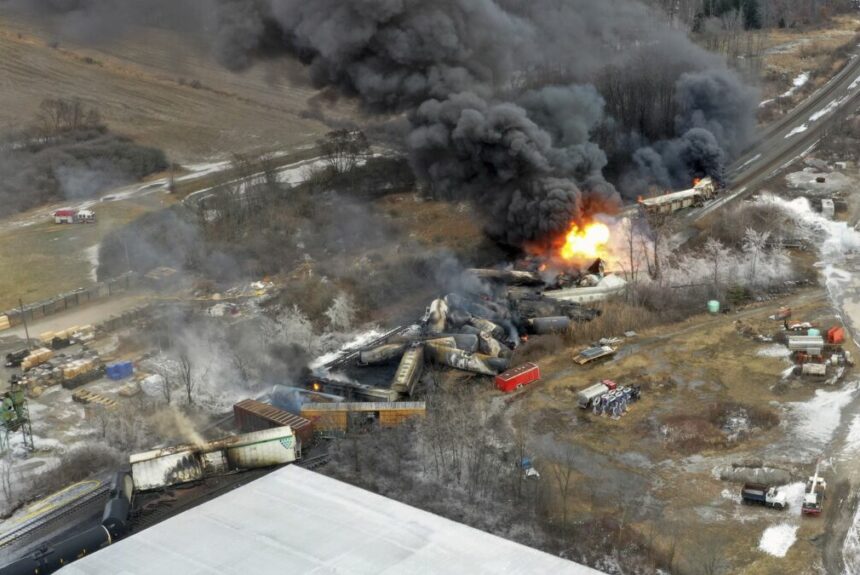Amidst an environmental crisis after a train derailment in East Palestine, Ohio, politicians are doing what they do best: pointing fingers. Both Democrats and Republicans criticized the Department of Transportation’s slow response. Transportation Secretary Pete Buttigieg and some Democrats are blaming former President Trump for easing rail safety regulations. Both parties have rightly said that Norfolk Southern, the railroad company, must be held accountable for the public health and environmental damages they cause.
>>>READ: Energy and Commerce Committee Addresses American Energy Security
There will be plenty of time to understand what went wrong, how federal agencies and Norfolk Southern could have responded more effectively, and if any policy fixes are necessary. Right now, the focus should be locked in on protecting the residents of East Palestine and surrounding communities, thoroughly cleaning up the environmental damage, and ensuring environmental and public health risks do not spread.
On February 3rd, a train derailed in northeast Ohio, near the Pennsylvania border. Of the 150-car train, 38 cars derailed and erupted into flames. Twenty of the derailed cars carried several chemicals, including five tankers of vinyl chloride. Vinyl Chloride is a hazardous, carcinogenic gas that companies use to manufacture PVC plastics and vinyl products. The derailed cars carried several other chemicals used in paints, packaging, plastics, coatings, and cleaners.
Fortunately, there were no fatalities or injuries, but the adverse environmental and public health impacts were almost immediate. Residents experienced eye irritation, rashes, headaches, and nausea. Ohio’s Department of Natural Resources reported more than 3,500 dead fish across 7.5 miles of streams as well as sick and dead wild and farmed animals. A controlled release and intentional burn of the chemicals has already triggered several class action lawsuits, as complaints have mounted that the decision made matters worse.
The U.S. Environmental Protection Agency (EPA), state officials, and the Columbiana County Health District continue to test indoor air quality in more than 500 homes, outdoor air quality, municipal drinking water, residential wells, soil, rivers and streams. As of February 19th, there was no reported exceedance of air quality standards and municipal drinking water was reported safe to drink. Fifty-two private wells were also reported safe. Contaminated soil and water remain a concern in East Palestine and neighboring communities. With planting season a few months away, farmers have expressed concern about their livestock and livelihoods.
>>>READ: Nikki Haley Gearing Up to Take on the Climate Left
Emotions in East Palestine and neighboring towns are understandably running high, filled with a combination of fear, anger, frustration, and mistrust. Residents remain skeptical as “[c]onfusing and seemingly shifting messages from government and railroad officials have frayed the local trust.” The fact that more chemicals were on the train than initially reported only served to entrench the distrust of Norfolk Southern and government agencies, prompting residents to take air, water, and soil testing into their own hands. Mix in Facebook, Twitter and TikTok and the narratives and misinformation run wild.
EPA Administrator Mike Regan ordered Norfolk Southern to pay for the cleanup costs, and the CEO Alan Shaw said the company “will stay here for as long as it takes to ensure your safety and to help East Palestine recover and thrive.” While orders and promises won’t feel like nearly enough for the residents of East Palestine, holding Norfolk Southern accountable and providing some assurance to make things whole is a necessary step in the process. The EPA order is legally binding and whether the derailment was an accident, act of negligence, or insufficient safety standards, the company will liable for the damage caused. Norfolk Southern has $1.1 billion in liability insurance. As of February 20th, it has distributed $3.4 million directly to 2,200 families, set up a $1 million community assistance fund, and set up a $1 million budget for a community liaison. Those funds may not nearly be enough, but it’s a start.
Though both sides have already politicized the environmental crisis in eastern Ohio, policymakers should refrain from knee-jerk reactions and get more complete answers as to what happened and why. The National Transportation Safety Board (NTSB) just issued its preliminary finding from its safety investigation and found that an overheated bearing was likely the cause of the derailment. Without a comprehensive assessment, however, policymakers and regulators are in no position to impose new actions that could do more harm than good. Blaming an absence of or weak regulations when we don’t know if that’s what caused the problem is irresponsible.
There will be opportunities to assess and potentially implement more efficient responses and communication at the federal and state levels (Transportation Secretary Pete Buttigieg said he should have spoken out sooner but DOT was on the ground day one). Until then, policymakers should remain united and committed in their support for East Palestine and other affected communities.
The views and opinions expressed are those of the author’s and do not necessarily reflect the official policy or position of C3.
